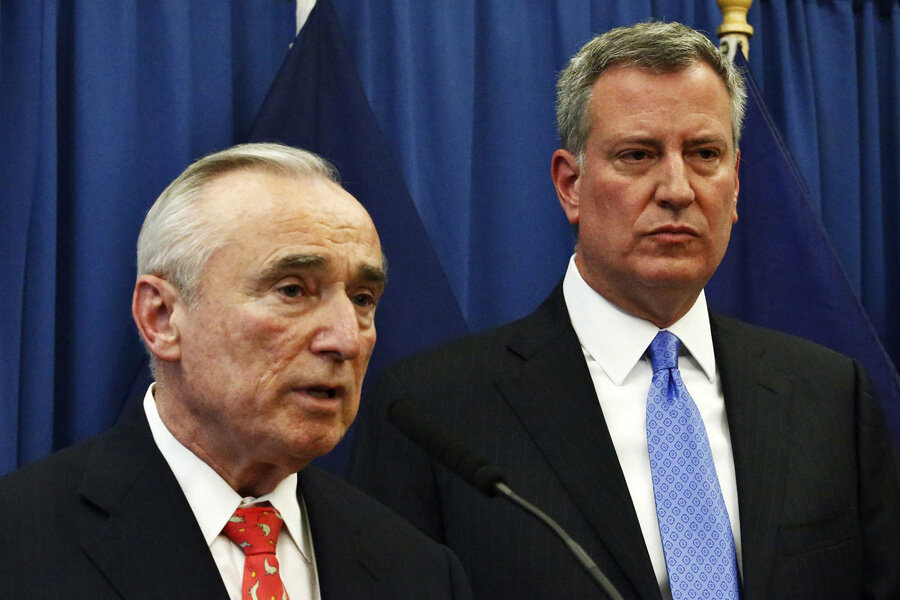Bill Bratton back in the saddle as NYPD commissioner
Loading...
| New York
William Bratton, whose tenure as New York City police commissioner in the 1990s was marked by a steep decline in crime and clashes with then-Mayor Rudolph Giuliani, has been chosen to lead the nation's largest police force again.
Mayor-elect Bill de Blasio announced the appointment Thursday, saying Bratton is a "proven crime-fighter" who knows how to keep the city safe.
Bratton is being named to lead the NYPD as it tries to maintain a historic drop in crime and an extensive counterterrorism program, even as its tactics have come under increased scrutiny.
Bratton, who has also led the Boston and Los Angeles police departments, will succeed Raymond Kelly, the NYPD's longest-serving commissioner. He is arguably the most important administration appointment for de Blasio, a Democrat who takes office Jan. 1.
"Together, we are going to preserve and deepen the historic gains we've made in public safety — gains Bill Bratton helped make possible," de Blasio said in a statement. "We will do it by rejecting the false choice between keeping New Yorkers safe and protecting their civil rights. This is an administration that will do both."
Bratton said his first duty will be "to bring police and community together. ... It must be done fairly, compassionately and consistently."
Bratton, known for his outsized personality and fondness for the limelight, was police commissioner under Giuliani, a Republican, from 1994 to 1996. He emphasized the broken-windows theory of police work: that criminals who commit small crimes, such as vandalism, also commit more serious crimes.
Bratton helped spearhead the use of CompStat, a data-driven system of tracking crimes that allows police to better allocate their resources to high-crime areas. The real-time system is still used today.
Crime immediately plummeted under Bratton, who benefited from an influx of new police officers.
The year before Bratton took office, there were 1,946 murders citywide; by contrast, in 1996 there were 983, the first time it had dipped under 1,000 since 1968.
But Bratton frequently fought with Giuliani over who deserved the lion's share of the credit. He resigned after two years.
Bratton, who had led the Boston Police Department and the formerly independent New York City Transit Police before running the NYPD, was tapped to head another big-city police force in 2002. He spent seven years atop the Los Angeles Police Department and is credited with cleaning up the scandal-plagued department's image. Crime dropped every year he was in office.
He has been working at private security firms since 2009.
De Blasio, who also interviewed NYPD Chief of Department Philip Banks and First Deputy Commissioner Rafael Pineiro before selecting Bratton, has long said he wouldn't keep Kelly as commissioner. But the mayor-elect has stressed he will try to continue the city's record public safety gains while improving police-community relations, which he said he believes have been strained by the police tactic known as stop-and-frisk.
The tactic allows police to stop anyone believed to be acting suspiciously. Its supporters say it has driven down crime while its critics say it unfairly targets black and Latino men.
Bratton, a Boston native, has said he supports the proper use of the tactic. Police stops surged 49 percent during his time in Los Angeles, according a study by the Harvard Kennedy School of Government.
A federal judge ruled over the summer that the NYPD sometimes carried out its stops unconstitutionally by unfairly targeting minorities. Her ruling is on hold pending an appeal by the city.
The appeal won't be heard until after de Blasio takes office, and he has said he'd drop it.
Civil Rights leader the Rev. Al Sharpton acknowledged he has been both an ally and adversary to Bratton during his previous tenure, but hopes the leaders can work together "to continue the decrease of violence and crime in our community."
De Blasio made reforming, but not eliminating, stop-and-frisk one of the centerpieces of this mayoral campaign. Many of his supporters believe that de Blasio's family gave him a powerful perspective on the issue: de Blasio, who is white, is married to a black woman and he said he worried that his interracial son would be unfairly stopped by police.
Both Banks and Pineiro are minorities.
Last year, there were 414 murders in the city, a record low, and this year is on pace to be lower still.
Kelly, who served as commissioner for two years under former Mayor David Dinkins and then 12 years under outgoing Mayor Michael Bloomberg, has been praised as one of the most effective commissioners in the NYPD's history.
Besides overseeing the historic reduction in crime, he dramatically bolstered the NYPD's counterterrorism and surveillance capabilities after the Sept. 11 attacks. The NYPD has foiled more than a dozen terror plots since but has come under criticism for its surveillance of Muslim communities, revealed in a series of Associated Press stories.
Bratton, who had publically campaigned for the top NYPD job, hasn't commented on the surveillance program.







